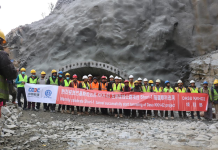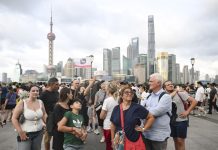DM Monitoring
HAIKOU: It was Zhou Xiaoyong’s ninth visit to Dongluo Island, an uninhabited island located 15 nautical miles from Sanya, a resort city in south China’s Hainan Province.
On his previous trips, Zhou, a procurator at Sanya Suburban People’s Procuratorate, gathered evidence on a case related to environmental damages filed through public interest litigation.
This time, however, Zhou came as a storyteller to introduce the case of Dongluo Island to Dimitri de Boer and his colleagues, who work for ClientEarth, a European environmental charity on legal affairs.
They came to China to gain experience in environmental protection.
Public interest litigation has become an important tool for protecting the environment in China. The country’s procuratorial organs handled more than 310,000 public interest lawsuits over the past three years, with more than 170,000 cases related to environmental protection and resource conservation.
In Europe, non-governmental organizations shoulder the responsibility of filing suits to stop projects deemed damaging to the environment, while in China, procurators can play a role in monitoring government departments, said De Boer, ClientEarth’s Chief Representative for China.
On Dongluo Island, the litigations led by Zhou has stopped illegal lumbering and constructions by a local tourism company that had plagued the island since 2008.
Without valid approval, the company had built reinforced concrete buildings, roads, breakwater and submarine cables in a bid to develop tourism on the island. It also illegally felled 2.3 hectares of trees.
Despite being fined 4 million yuan (about 610,800 U.S. dollars), the company continued to develop the island, instead of restoring the ecology.
Zhou and other procurators found that local authorities in charge of natural resources and planning, administrative enforcement of law and agriculture and rural affairs, had not properly fulfilled their duties, leading to damages to the ecological environment of the island and surrounding waters.
Zhou visited the island eight times over the past year to gather evidence. Thereafter, he offered procuratorial suggestions to relevant government departments asking them to fulfill their statutory obligations strictly.
In accordance with the suggestions from Sanya Suburban People’s Procuratorate, related government departments have imposed various penalties on the company between late 2019 and 2020.
Besides, other corrective measures have also been adopted. The approval procedure and construction project on Dongluo Island have been suspended, illegal buildings have been demolished, and the company has been asked to pay a fine of about 1.5 million yuan, which will be used to restore the marine ecosystem.
Meanwhile, the company has dismantled 34 buildings covering 2,929 square meters and planted more than 7,000 trees covering 2 hectares, Zhou said.
“We have realized the ill effects on the environment and public interest. In the future, we will develop the island legally with proper environmental assessment to minimize the negative impact,” said Ouyang Lan, the project head of the company.
Qiu Jinghui, a procurator with China’s Supreme People’s Procuratorate, said the Procuratorate is planning to build an online platform that would allow concerned individuals to provide leads on environmental damage to procuratorates, monitor the progress of cases, and assess the outcomes.
“What I find really nice is that the Chinese government is very open to explore the real problems and find their solutions,” said De Boer.






